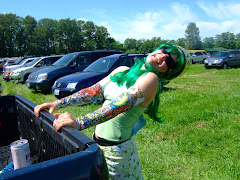 of letters, words, and the ideas and stories resulting from their combinations. "Think of me as a P.E. teacher, only for your brain," I tell them. "It's my job to motivate you to exercise and strengthen those brain cells by reading, just the way your P.E. teacher tries to help you develop a strong body by making you play badminton and go power-walking."
of letters, words, and the ideas and stories resulting from their combinations. "Think of me as a P.E. teacher, only for your brain," I tell them. "It's my job to motivate you to exercise and strengthen those brain cells by reading, just the way your P.E. teacher tries to help you develop a strong body by making you play badminton and go power-walking." Since I've been a librarian, I'm forever on the look-out for information supporting the connection between reading and brain power. Luckily, there is a lot of it. And none that I've found (so far) that says any kind of reading is harmful to brain cells, unless you're lounging around with a bottle of Jack Daniels and a crack pipe while trying to read the instructions on a rocket launcher. The research is pretty conclusive: read more=strengthen the connections between neurons=solve problems more effectively=kick your roommates' butts on crossword puzzles=live happily ever after.
David Eagleman is a neuroscientist at Baylor University whose first book of fiction, Sum: Forty Tales of the Afterlife, is a stunning collection of forty short stories--all addressing the question, "What, if anything, happens when we die?" Eagleman has impressively imagined some possibilities in language so clear and yet so artful that it reads like poetry. He obviously not only understands the brain, but has one of his own that is adept at orchestrating some amazing unions between words and ideas.
In the opening story, "Sum," the dead experience their lives over again--except this time, all like activities are grouped together and occur in a clump before the next event happens: two weeks are spent counting money, 18 days staring into the fridge, seven months having sex, etc. "In this afterlife, you imagine something analogous to your Earthly life, and the thought is blissful: a life where episodes are split into tiny, swallowable pieces, where moments do not endure, where one experiences the joy of jumping from one event to the next like a child hopping from spot to spot on the burning sand."
In "Mary," the dead discover that Mary Shelley sits on a throne, protected by angels, because God's favorite book is Frankenstein. Having created humans and watched them destroy each other, God now "locks Himself in His room, and at night sneaks out onto the roof with Frankenstein, reading again and again how Dr. Victor Frankenstein is taunted by his merciless monster...and God consoles Himself with the thought that all creation necessarily ends in this: Creators, powerless, fleeing from the things they have wrought."
Although generally serious in tone, throughout Sum there is an undercurrent of intelligent humor--not mocking, exactly, but a sly questioning of assorted systems of belief and their corresponding visions of the afterlife: we live forever, we are punished, we celebrate, we are reunited, we are remembered, we remember, we are completely forgotten, we forget everything we ever knew; we are exactly the way we were on earth, only better. Or worse.
In examining our perceptions about death, Eagleman creates a remarkably insightful dissection of how we live, and in particular, how we think about ourselves. We are gargantuan and meaningful or infintismally inconsequential. We are everything, or we are nothing.

No comments:
Post a Comment